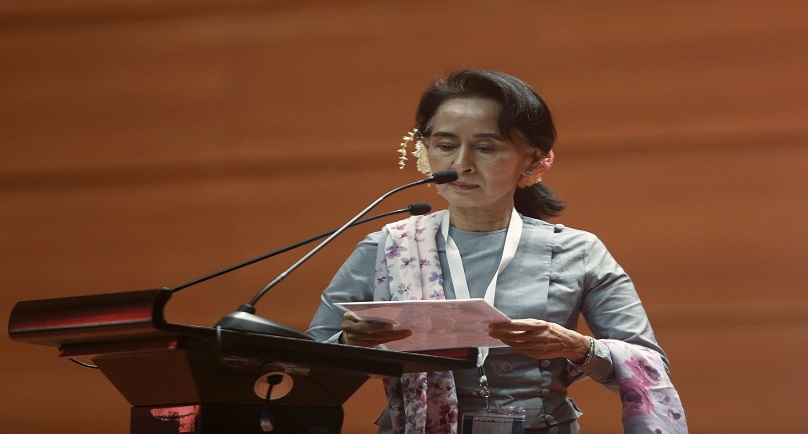Image: Myanmar’s Aung San Suu Kyi gives a speech during talks between the government, army and representatives of ethnic armed groups over a ceasefire to end insurgencies, in Naypyitaw January 12, 2016. REUTERS/Soe Zeya Tun
By Hnin Yadana Zaw and Antoni Slodkowski
YANGON (Reuters) – Aung San Suu Kyi’s last-minute decision to join Myanmar peace talks she had previously criticised took some attendees by surprise, and could boost the chances of progress with rebel groups who have so far resisted joining the process.
The democracy champion, who led her party to a landslide election victory in November, shared the stage in the capital Naypyitaw with members of the former military junta, which kept her under house arrest for years and persecuted her allies.
Suu Kyi has already shown she is willing to do business with former foes, and, despite a constitutional ban on her becoming president, has also made clear that she intends to lead the country.
Her appearance at peace talks this week attended by the military, members of parliament and some of the armed guerrilla groups waging local insurgencies across Myanmar underlined that sense of pragmatism, experts said.
Until now, Suu Kyi had dismissed the ceasefire agreed last year as a pre-election stunt by outgoing President Thein Sein to win votes in ethnic areas.
“Today’s conference shows how the talks over the political transition and change of government in Myanmar are progressing unexpectedly quickly and smoothly as the parties learn to trust one another,” said Yohei Sasakawa, a peace envoy for Japan who has been involved in the talks for the last three years.
By appearing to endorse Thein Sein’s efforts, Suu Kyi is also signalling to rebel groups to trust her and return to the negotiating table, Sasakawa added.
“I think this has sent a very powerful message toward the groups that have thus far withheld their support for the ceasefire,” he told Reuters.
Thein Sein was on stage with Suu Kyi on Tuesday for the talks, as was army chief Min Aung Hlaing and other leading members of the former junta that ruled the country for 49 years until a semi-civilian government came to power in 2011.
TEST OF MILITARY’S INTENTIONS
In October, Thein Sein’s government signed what it called a nationwide ceasefire agreement, but seven of 15 rebel groups invited to participate declined to sign, including some of the most powerful.
Other groups were not invited to take part or showed little interest in the process.
This week’s five-day meeting attended by hundreds of representatives of guerrilla groups was arranged to advance the peace process.
While ostensibly a conciliatory step towards former enemies, Suu Kyi’s move also carries considerable risks, Western diplomats and political analysts said, because it means she has associated herself with a process she cannot fully control.
Since October, the army has been engaged in an offensive against ethnic rebel groups in the north and the east of the country, displacing thousands of people.
Suu Kyi’s involvement in peace talks will also test how far the military, which maintains considerable influence over Myanmar politics, is willing to submit to civilian control.
Experts and some participants at the talks said Suu Kyi’s appearance is likely to be only the start of her formal engagement, and major breakthroughs in peace talks are unlikely until her government is formed.
Clinching a lasting ceasefire would be a historic feat for Suu Kyi and could help tens of thousands of people displaced by fighting, as well as open up areas of the country where conflict has prevented development since as long ago as World War Two.
It would also bring a more integrated state with a fuller representation of its ethnic nationalities, delegates said.
“In our country, we have many things to negotiate, as there are many key players, such as the army, the government and ethnic groups. So the discussions will take a long time,” said Sui Khar, a leader of the Chin National Front whose armed wing has fought the government for nearly 30 years.
“But I believe it will happen, one’step at a time.”
(Reporting by Antoni Slodkowski; Editing by Mike Collett-White)
Copyright 2015 Thomson Reuters. Click for Restrictions.


